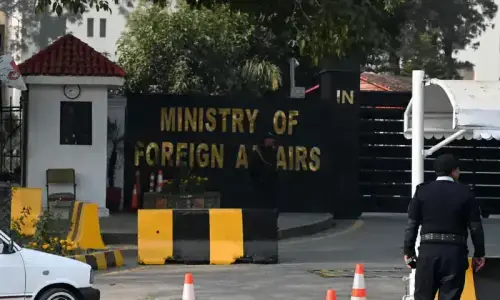ISLAMABAD: The much-awaited National Energy Policy 2013-18 has been formulated by the government and would be presented in the Council of Common Interest (CCI) on Tuesday for final approval.
The policy aims at achieving the goals of social development and prosperity for the country, highlighted earlier as ‘Roshan Pakistan’ in Pakistan Muslim Leage-Nawaz’s (PML-N) manifesto.
Under the policy, power sector subsidy would be phased out till an end to it, while an end to load shedding would be made possible till 2017 and surplus electricity in 2018. Privatisation of government owned power plants and few power distributing companies (Discos), bringing the double digit cost of power generation to a single digit, restructuring of water and power ministry, National Electric Power Regulatory Authority (Nepra), Oil and Gas Regulatory Authority (Ogra) adjustment of outstanding dues owned by the government owned and privately owned bodies through federal adjusters, and formation of regional transmission and power trading system would be made.
Available draft copy of National Energy Policy 2013-18 with DawnNews has disclosed that Pakistan’s Ministry of Water and Power had developed this energy policy to support the current and future energy needs of the country.
Highlighting the challenges faced by the ailing energy sector of the country, the new policy says that Pakistan’s power sector is currently afflicted by a number of challenges that have led to a crisis: A yawning supply-demand gap where the demand for electricity far outstrips the current generation capacity (up to 4500-5000mw). Highly expensive generation of electricity (Rs12/unit) is due to an increased dependence on expensive thermal fuel sources (44 per cent of total generation). A terribly inefficient power transmission and distribution system that currently records losses of 25 to 28pc due to poor infrastructure, mismanagement and theft of electricity.
Long Term Goals
The new energy policy aims to build a power generation capacity that can meet Pakistan’s energy needs in a sustainable manner. The policy also aims to create a culture of energy conservation and responsibility, ensure the generation of inexpensive and affordable electricity for domestic, commercial and industrial use, minimise pilferage and adulteration in fuel supply and promote world-class efficiency in power generation. It further envisages creating a cutting edge transmission network, minimising financial losses across the system and aligning the ministries involved in the energy sector and improve governance.
However, the policy also mentioned that ‘a clear strategy has to be articulated for each of the aforementioned goals in order to actualise the power sector’s aspirations’.
Policy Principles
The policy also disclosed that efficiency would be predicted on three pillars of merit order, transparency/automation, and accountability. Similarly, competition will be built on three pillars: upfront tariff and competitive bidding, and key client management.
Infrastructure will be developed and incentives provided to attract greater private sector investments. The government will set the foundations of energy cities and corridors and sponsor public-private partnership for coal and run of river projects. The government will also redesign and strengthen the national grid transmission network and build a regional transmission and power trading system. The government would like to limit its role to policy making and unless necessary, service delivery will be promoted through a fiercely competitive and transparent private sector.
The tariff and competitive bidding process will be controlled by a world-class regulatory authority. Up-front tariffs will be set for low cost fuel and competitive bidding will be used to decrease the costs further. Similarly, a transparency and competitive process will be established to privatise government assets.
Supply strategy
Overall, the strategy to achieve the above goal is focused on attracting and directing local and foreign investments towards rapidly expanding the power generation capacity. Investments can only be encouraged if the sector is made attractive and bankable by treating the subsidy to the abject poor and clearing it out through cross subsidisation mechanisms.
Demand management strategy
“The strategy may impose timing restrictions for evening commercial activities and introduce time of use metering to discourage utilisation during the peak hours by charging different rates for on and off peak timings. Solar and alternative power solution will be encouraged for end users, street lighting, electronic billboards, neon lighting, shop front signage, etc. In addition, the price signal articulated through reducing and targeting subsidy will naturally optimise demand and utilisation,” National Energy Policy 2013-18 reads.
Affordable power strategy
The strategy focuses on shifting Pakistan’s energy mix towards low cost sources such as hydel, gas, coal, nuclear and biomass. Local and foreign investment will aggressively sought for small and medium size run of river hydel projects. Selected hydel projects under development will be positioned for privatisation. Multilateral agencies will be invited to partner in large infrastructure hydel projects.
LNG terminals will be developed in close collaboration with friendly countries such as China. Development of coastal energy corridors based upon imported coal (mixed later with local coal), rapid proliferation of coal mining all across the country-especially at Thar and conversion of expensive RFO (residual fuel oil) based plants to coal are the central tenets of coal policy. The proposed strategy will change the energy mix of Pakistan in favour of low cost sources and significantly reduce the burden of energy to the end consumer.
Supply chain strategy
Once the relief from load shedding is forthcoming because of a decreased supply and demand gap. This strategy will focus on redirecting the supply of fuel from inefficient GENCOs to the most efficient IPPs (independent power producers). This reallocation alone has the potential of saving Rs3billion per month and generation an additional 500mw of electricity.
At the same time, water and power ministry will sign performance contracts with GENCOs, PSO and fuel transporters and hold them accountable for the quality and theft of oil. Fuel procurement contracts may be made open sourced to eliminate the power of a single supplier. Leakage will be plugged by building fuel pipeline where possible and open decanting. In the event that fuel is found to be missing or adulterated, the fuel economic value of the fuel will be appropriated to the end receiver.
Generation Strategy
The strategy focuses on establishing plant efficiency through external heat rate testing, building a merit order accordingly, and allocating fuel to the more meritorious plants. Allocations will be made public online to increase the transparency. The strategy calls for the privatisation or O&M based leasing of GENCOs.
Transmission Strategy
The transmission strategy is based on installation of upgrade SCADA software to optimise transmission and monitor its losses. Dispatch will be based on economic order and internal/audit control will be established on dispatch and payment. Plants will be built closer to load centers; high voltage transmission lines will be expanded; and the 220kv rings around cities will be strengthened.
Distribution Strategy
In short term, performance contract will be signed with the heads of distribution companies and their respective boards focused on reducing distribution losses due to technical reason, theft, and lack of recovery/ collection. Smart meters will be installed at the feeder level, profit and loss accounts will to be managed at the feeder level, and the accountability will be appropriated to the Executive Engineer. A regime of reward and punishment will be use to improve efficiency and decrease theft.
In the medium term, the efficiency will be improved by privatising a selected number of distribution companies.
Financial Efficiency Strategy
The strategy is geared towards punishing private defaulters and proposes severing the electric connection of defaulters after 60 days of non-payment and only reconnecting them to the grid with pre-paid meters. External collection agencies may also be sourced to improve cash flows. At the same time, load-shedding may be focused on areas of high theft and low collections as opposed to the current structure of indiscriminate load-shedding.
Governance Strategy
The strategy requires the reformation of structural and regulatory aspects of NEPRA and OGRA to improve efficiencies. New business models including power exchanges and wheeling charges will be explored. Finally, the Ministry of Water and Power will be restructured to strengthen its functional expertise. Directorates will be created for key functions (i.e generation, transmission and distribution) and key organisation such as CPPA, and NTDC will be reformed.
Lasting Impact
The successful implantation of this policy will lead to enormous improvement within the power sector. By 2017, the supply-demand gap could be eradicated completely; and by the end of the five-year term of the current government the will be power surplus. The cost of power generation will be reduced to a single digit per unit, and the efficiency improvements in transmission and distribution will decrease the burden of power the end consumer.





























